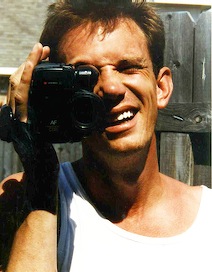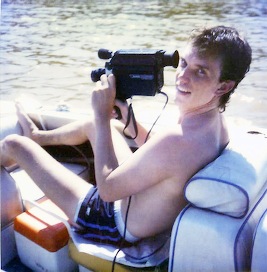Documentary Review: TV Junkie (HBO2)
03/15/07 04:39 PM


By ED BARK
Few have been more ready for their closeups. The result is TV Junkie, a powerful, unsparing and decidedly narcissistic look at a television journalist's addictions to fame, fortune and, most particularly, the drugs it could buy.
Rick Kirkham's the name, and he used to be a well-traveled national correspondent for Inside Edition during Bill O'Reilly's reign. His 90-minute film, premiering Friday (March 16) at 9 p.m. central on HBO2, is part of the network's ambitious, multi-media Addiction project. It's gleaned from some 3,000 hours of footage that Kirkham devoted mostly to himself, his wife, Tami, and their young sons, Ricky and Dusty. Last year's Sundance Film Festival gave TV Junkie its Special Jury Prize.
Kirkham, now 49, grew up in Oklahoma in an Ozzie and Harriet setting that soon faded to black. His dad did three tours in Vietnam while mom increasingly hit the Valium bottle. They eventually divorced, leaving young Rick to bounce between parental units. On his 14th birthday, lightning struck in the form of a home movie camera that "would become his best friend," the film says in its setup.
The rest is history -- his history. It seems that Kirkham loved the lens more than Anna Nicole Smith. Encouraged by Dick Clark after he danced on American Bandstand, Kirkham gravitated quickly to the TV news biz.
He worked in Wichita Falls and Las Vegas before joining Inside Edition in 1988. By that time he had a serious jones for crack cocaine. And this guy has all the proof you need in self-filmed footage of various one-night stands. Co-directors Michael Cain and Matt Radecki helped stitch it all together after former NBC5 reporter Marty Griffin clued them to what Kirkland had.
On his 37th birthday, for instance, he smokes crack alone in a New York hotel room while matter-of-factly doing the play-by-play. His velvet-toned TV voice is always on, even if Kirkham at first says it's "really weird talking to a camera doing this."
Cocaine, he later says, is "this rotten drug. How can something be so euphoric and good -- and so terrible."
By this time he's married a woman from Terrell, TX. Tami is part of his before-its-time Truman Show, often filming herself at her husband's instructions when he's away on assignment. Their sons are both born in North Texas -- on camera of course. Tami holds down the home fort while Rick professes his love on the long distance line before again lighting up the true love of his life.
At first he's kind of likable, a self-aware addict with a conscience of sorts. But Inside Edition eventually dumps him, sending Kirkham spiraling downward into a self-pitying jerk who blames his wife whenever possible because "Honey, I've got it all recorded on tape."
Tami struggles to keep the faith, with two stints in rehab finally seeming to straighten her husband out.
"Momma likes this new man," she enthuses while daddy cooks breakfast on Thanksgiving morning, 1997.
Kirkham even catches a second wind at little KTEN-TV in Sherman-Denison, where former Belo8 anchor Scott Sams is still the main man while at the same time angling to land a vacant morning post at CBS11 in Dallas-Fort Worth. The Kirkhams move from Plano to Pottsboro, TX, where they buy a log cabin and prepare to settle in for a spell. He enjoys being "in a smaller market where you can get away with murder and have fun."
Nine months later it's over -- the job and soon the marriage. It gets increasingly hard to watch all these drug-induced traumas, particularly when a wailing little Ricky seems to know exactly what's going on. That's the point, though. It's supposed to be hard, and Kirkham doesn't soften the blows.
TV Junkie in the end succeeds as a cautionary tale that cuts deep and then deeper, in a sense performing an autopsy while its star player remains on life's playing field. It takes a sick man, on several levels, to want so very much of his personal life left behind on camera.
But Kirkham somehow made the right choices, both with this film and by lately walking the straight and narrow. He's supposedly been drug-free since 1998, and it's hoped that any latter day fame and fortune tied to TV Junkie won't trigger another relapse.
A TV Junkie II just won't do. And it likely would be posthumous.
Grade: A
|
